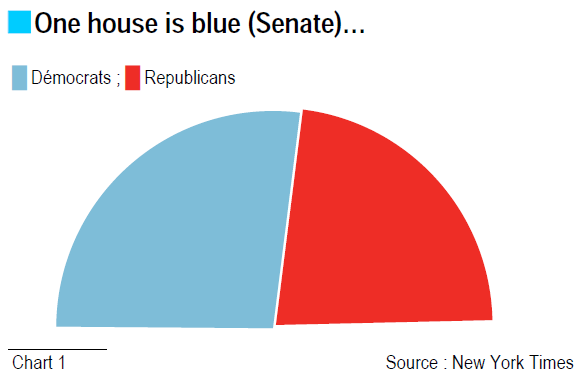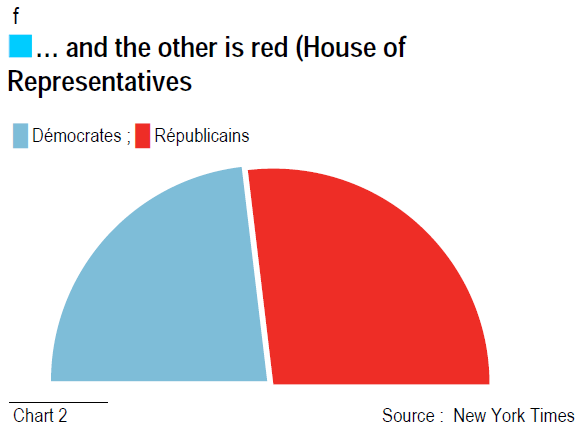In the end, President Obama was re-elected more easily than the polls predicted, winning nearly all of the swing states (states which vote Democrat in some elections and Republican in others and thus decide the presidential race; of these Mitt Romney won only North Carolina, and then only narrowly, with just 50.6% of the votes) and losing only two of the states he carried in his first election: North Carolina and Indiana.
The results of the Congressional elections were in line with our expectations: the Democrats maintained control of the Senate and the Republicans retained a majority in the House of Representatives. However, the results were enlivened by a few surprises: the Democrats won an extra seat in the Senate (giving them 54 to the Republicans’ 45 and one independent), whilst the Republicans lost only seven seats in the House (240 members against 195 Democrats).
So can either Democrats or Republicans claim overall victory? This is a difficult question to answer. Granted, President Obama was re-elected with a comfortable majority in the Electoral College (at least 303 votes, and perhaps 332 if he can finally claims victory in Florida, against 206 for Mr. Romney). He also won the popular vote (around 51% of the total, giving him a lead of around 2.8 million votes over his rival). But, although he has lost only two states over the past four years, he has also dropped some 9 million votes. This was probably exacerbated by difficulties for voters in states affected by Hurricane Sandy, particularly in New Jersey and New York, two Democrat strongholds in which President Obama lost 1.2 million votes.
Losses of House seats by the Republicans were surprisingly small given the record unpopularity of the previous legislature. This could allow Republicans to claim public support for their intransigence on fiscal matters. We would take a more moderate view: one should remember that Republicans had control over the redrawing of electoral maps in most of the 50 states, and this almost certainly played in their favour. Meanwhile it is clear that the extra Democrat Senator is an even more positive result given that most of the seats up for election were previously occupied by Democrats.
In summary, our analysis is that the Democratic Party has come out of these elections stronger, but this is by no means a consensus view. Negotiations (on ways of avoiding the fiscal cliff, raising the debt ceiling and reducing the deficit over the medium-term) will be difficult, but President Obama and the Speaker of the House (Republican John Boehner) have both declared themselves confident in the outcome.


The latter has indicated that he is open to an increase in tax revenues (read: increasing the tax base through eliminating certain tax loopholes but without touching tax rates) of USD 800 bn over ten years. President Obama has the more ambitious target of USD 1,500 bn Agreement could be reached somewhere between the two figures and would probably be accompanied by cuts in discretionary spending, as well as a reform of so-called mandatory programmes such as Social Security (public pensions), Medicare (health coverage for senior citizens) and Medicaid (health cover for the poorest). In all likelihood it is the first of these three programmes that will see reforms. It certainly needs them, albeit not as much as Medicare. But again, this is just our point of view.
By Alexandra ESTIOT
The results of the Congressional elections were in line with our expectations: the Democrats maintained control of the Senate and the Republicans retained a majority in the House of Representatives. However, the results were enlivened by a few surprises: the Democrats won an extra seat in the Senate (giving them 54 to the Republicans’ 45 and one independent), whilst the Republicans lost only seven seats in the House (240 members against 195 Democrats).
So can either Democrats or Republicans claim overall victory? This is a difficult question to answer. Granted, President Obama was re-elected with a comfortable majority in the Electoral College (at least 303 votes, and perhaps 332 if he can finally claims victory in Florida, against 206 for Mr. Romney). He also won the popular vote (around 51% of the total, giving him a lead of around 2.8 million votes over his rival). But, although he has lost only two states over the past four years, he has also dropped some 9 million votes. This was probably exacerbated by difficulties for voters in states affected by Hurricane Sandy, particularly in New Jersey and New York, two Democrat strongholds in which President Obama lost 1.2 million votes.
3rd party Ad. Not an offer or recommendation by Investing.com. See disclosure here or remove ads.
Losses of House seats by the Republicans were surprisingly small given the record unpopularity of the previous legislature. This could allow Republicans to claim public support for their intransigence on fiscal matters. We would take a more moderate view: one should remember that Republicans had control over the redrawing of electoral maps in most of the 50 states, and this almost certainly played in their favour. Meanwhile it is clear that the extra Democrat Senator is an even more positive result given that most of the seats up for election were previously occupied by Democrats.
In summary, our analysis is that the Democratic Party has come out of these elections stronger, but this is by no means a consensus view. Negotiations (on ways of avoiding the fiscal cliff, raising the debt ceiling and reducing the deficit over the medium-term) will be difficult, but President Obama and the Speaker of the House (Republican John Boehner) have both declared themselves confident in the outcome.


The latter has indicated that he is open to an increase in tax revenues (read: increasing the tax base through eliminating certain tax loopholes but without touching tax rates) of USD 800 bn over ten years. President Obama has the more ambitious target of USD 1,500 bn Agreement could be reached somewhere between the two figures and would probably be accompanied by cuts in discretionary spending, as well as a reform of so-called mandatory programmes such as Social Security (public pensions), Medicare (health coverage for senior citizens) and Medicaid (health cover for the poorest). In all likelihood it is the first of these three programmes that will see reforms. It certainly needs them, albeit not as much as Medicare. But again, this is just our point of view.
3rd party Ad. Not an offer or recommendation by Investing.com. See disclosure here or remove ads.
By Alexandra ESTIOT
Which stock should you buy in your very next trade?
With valuations skyrocketing in 2024, many investors are uneasy putting more money into stocks. Unsure where to invest next? Get access to our proven portfolios and discover high-potential opportunities.
In 2024 alone, ProPicks AI identified 2 stocks that surged over 150%, 4 additional stocks that leaped over 30%, and 3 more that climbed over 25%. That's an impressive track record.
With portfolios tailored for Dow stocks, S&P stocks, Tech stocks, and Mid Cap stocks, you can explore various wealth-building strategies.
